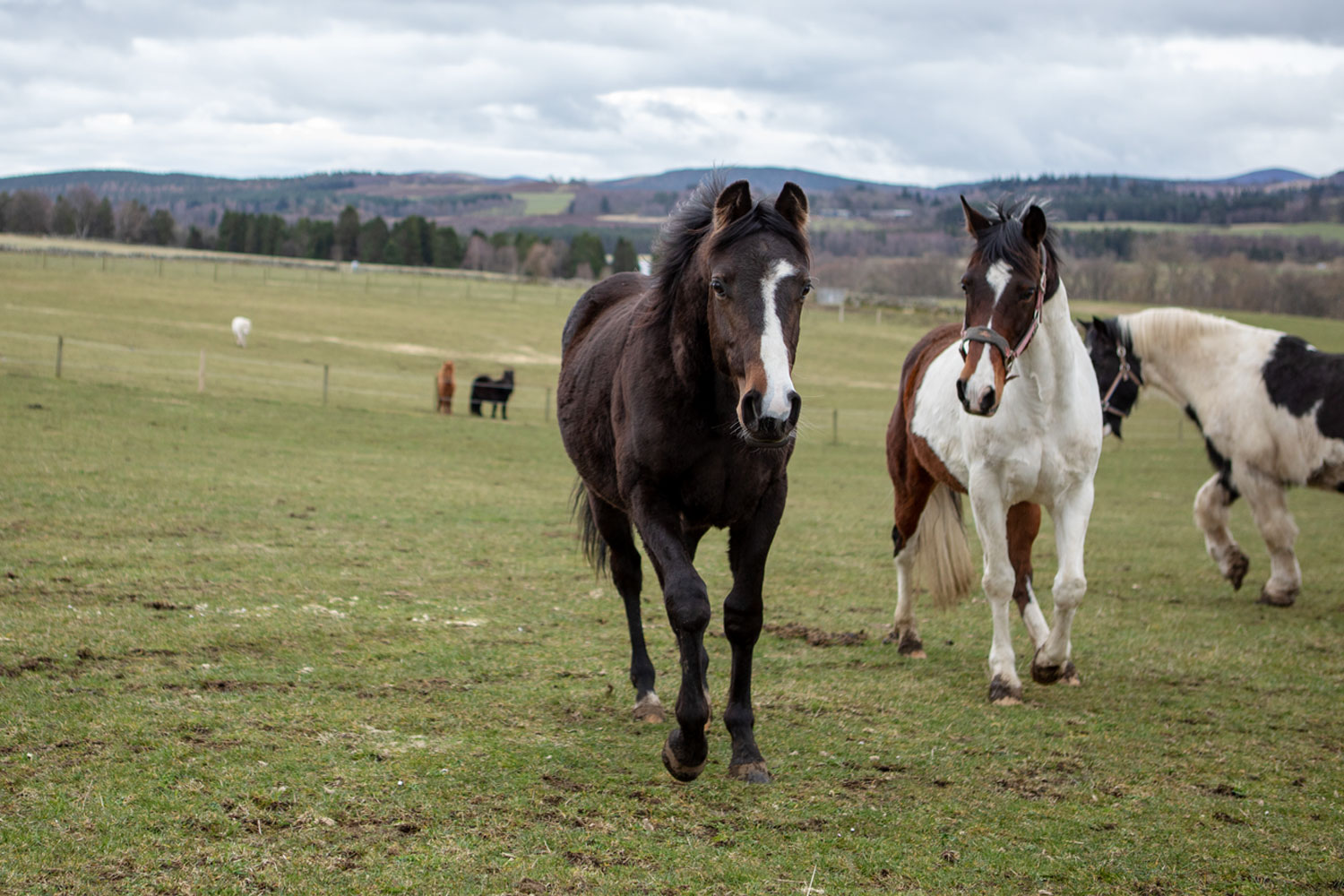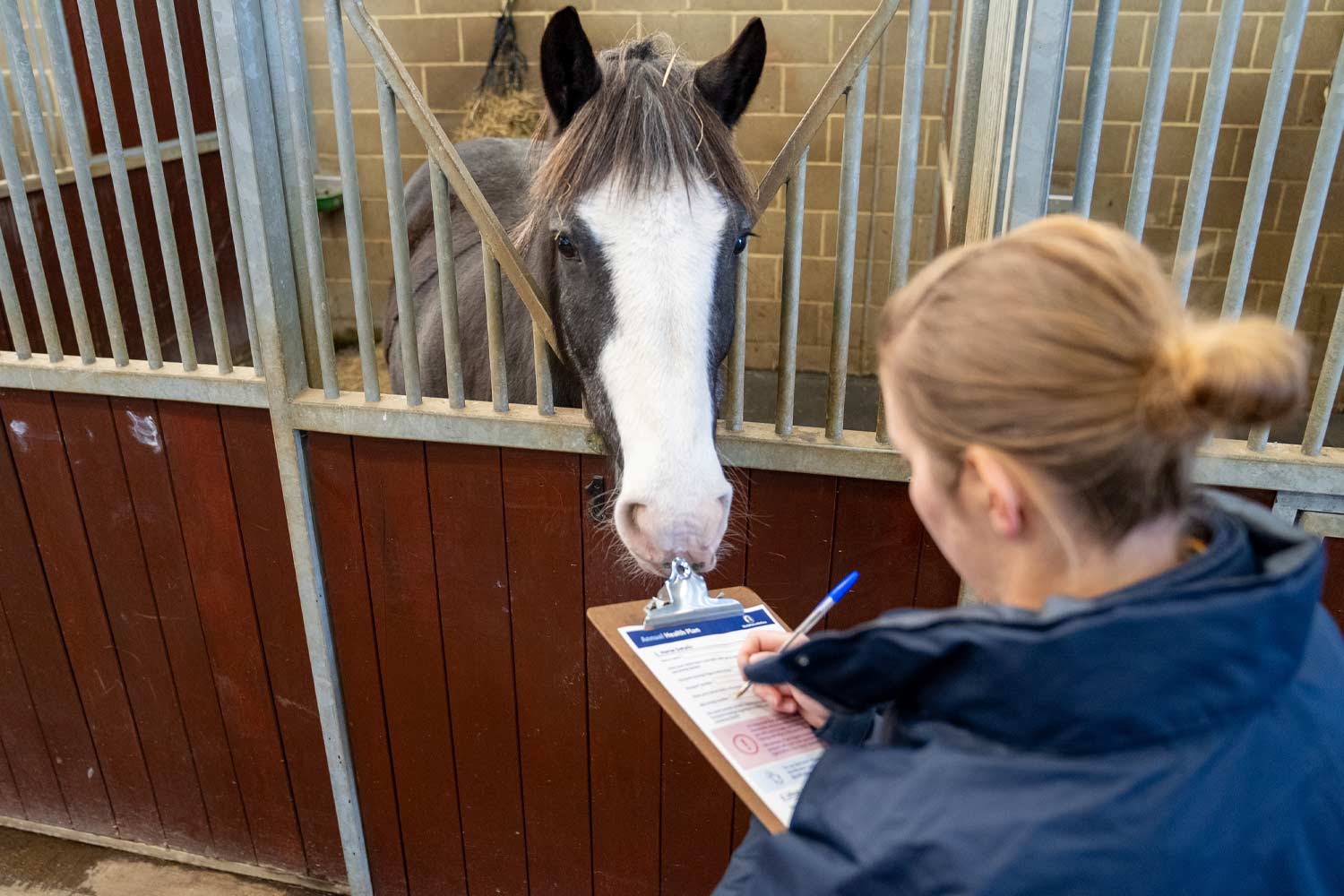Our top 10 routine health essential considerations
1. Vital signs
It is important that you are aware of what is normal for your horse in terms of their temperature, pulse and respiration so that you can spot signs of ill health early. For a healthy, adult horse, normal values are usually in the following ranges:
- Temperature: 37.5–38.5°C
- Pulse: 36–42 beats per minute
- Respiration: 8–12 breaths per minute
It is important to learn what your horse’s individual, normal temperature, pulse and respiration rates are. This can be done by recording each one every day for week, whilst the horse is stood calmly at rest, and then taking an average.
To learn how to take your horse’s temperature check out our helpful video guide below.
2. Monitoring behaviour
Get to know your horse’s typical behaviours. Monitor them for any behaviour changes that could indicate that something is wrong with your horse’s health or environment. For more information see our Behaviour advice page.
3. Daily health check
Horses should be visited at least once a day, and ideally more frequently. It is important to check your horse is sound, check both eyes and check their body and limbs for injuries, lumps, swellings, and/or heat. This can be done whilst grooming and picking out their feet. It is important to check that horses are eating and drinking normally, as well as urinating and defecating normally. If you suspect there is anything wrong, early intervention is key, and we recommend you call your vet. In the case of an emergency, always call your vet.

4. Vaccinations
Vaccinations for equine influenza (flu) and tetanus should be part of your horse’s annual health plan. Flu vaccines may be required every 6 months if your horse is competing, so it is important to check your governing bodies’ rules. Ensuring horses are vaccinated helps keep them safe and prevents the spread of disease.
5. De-worming
Worms are increasingly developing resistance to the drugs used in de-wormers. Resistance is driven by use of de-wormers, so it is important that we use these drugs wisely and appropriately. Always base your decision whether to worm your horse or not on faecal egg counts, and saliva and blood tests. Enlist the help of your vet or SQP/RAMA (Suitably Qualified Person/Registered Animal Medicines Advisor) to help formulate a bespoke worm control plan. Regular poo picking and having a pasture management plan is an effective way of preventing your horse from getting infected with parasites. For more information see our Worms: How to control them in horses advice page.
6. Monitoring weight and condition
Horses that are over or under weight are more likely to suffer from additional health conditions. You can assess your horse’s condition through regular fat scoring and you can monitor their weight using either a weigh tape or a weigh bridge. For more information see our Weight: is your horse the right weight? guidance.
7. Hoof care
Horses should have their hooves trimmed and/or be shod by a qualified and registered farrier, on average, every 6 –8 weeks. Some horses may need to be seen more regularly. Each horse’s individual needs should be taken into account when trimming and/or shoeing, especially if they require remedial shoeing or trimming for a specific issue such as navicular disease/heel pain or laminitis.

8. Dental care
Horses should be seen by a qualified equine dental technician or a vet for dental treatment at least once a year. Many horses develop sharp points on their teeth due to uneven wear, and these can lead to cuts and ulcers on the tongue and/or the inside of the horse’s cheeks which cause pain and can prevent them from eating properly. Additionally, gaps between teeth can cause packing of food and lead to infection. Some horses may need to be seen by an equine dental technician or vet more often than once a year. For more information see our Teeth advice page.

9. Tack fitting
Horses in ridden work should be seen by a qualified tack fitter every 6 months, or more often if the horse is growing or changing shape. It is important that your horse’s bridle, bit and saddle are fitted correctly and well maintained to ensure that they do not cause your horse any pain or discomfort. For more information see our bride fit and saddle fit advice.
10. Environment
The horse’s environment should be safe and suitable for their needs. Horses displaying behavioural signs of poor mental well-being, such as aggression or stereotypic behaviours like crib biting or weaving, should be taken as seriously as those showing physical symptoms of ill health. For example, you should make changes to a horse’s environment if they have laminitis or equine metabolic syndrome (EMS), but also if they weave in their stable. Whether your horse is stabled or lives out, their environment should provide enrichment through foraging opportunities and the ability to have physical contact with other horses. For more information see our 3Fs – Friends, forage and freedom and The 5 Domains of animal welfare advice pages.
Popular advice in Well-being essentials

The 3Fs – Friends, forage and freedom
Find out how you can meet your horse’s fundamental needs using the 3Fs.

The Five Domains of animal welfare
Find out how you can meet the species specific needs of your horse using the Five Domains of animal welfare.
Other advice categories
All webinar categories:
Call our Advice Line
+44 (0)1953 497 238Not found the advice you were looking for? Our friendly team of horse care experts offer free practical advice. What can we help you with today? Our advice line is available 8.30am-5:00pm, or you can email education@worldhorsewelfare.org.


